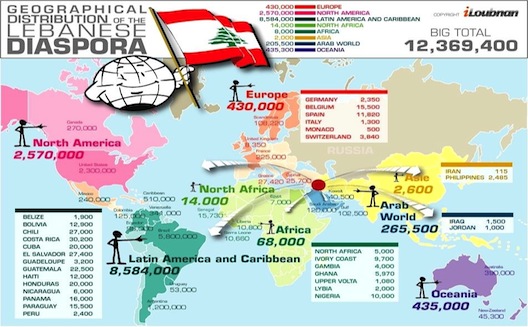World Bank wants to help Lebanese and Tunisian diasporas give back


As part of a new project, Integrating the Middle East and North Africa (i-MENA) aiming to foster MENA global integration, the World Bank is engaging with the Lebanese and Tunisian diaspora populations to determine how their knowledge resources could be leveraged for economic growth in their respective countries of origin.
Diasporas and diaspora networks abroad are especially important reservoirs of knowledge about trade and investments opportunities, as well as technical and scientific expertise. Members of a diaspora can contribute in several ways to development in their country of origin, through financial remittances, homeland investments, philanthropy, political influences, and most importantly skills and knowledge transfer. Many countries, like India, Chile, Ireland, have already seen development in some sectors thanks to strong engagement with their diaspora populations.
Lebanon’s and Tunisia’s skilled diasporas are relatively small when compared to countries like India, China, or the Philippines. The Organization for Economic Co-operation and Development reports that there are about 151,000 and 94,000 highly educated Lebanese and Tunisians respectively in OECD countries. Nevertheless, when compared to the country’s home population, Lebanon’s high-skilled diaspora stands out with a rate of 3.41% (compared only to Ireland’s 4.95%) while Tunisia stands at 0.87%.
Despite the country’s small population and troubled history, Lebanon’s highly dispersed diaspora have brought much attention and debate about its role and reach, and has been a source of pride for many Lebanese. The richest man in the world from 2010 to 2013, Carlos Slim, is a Mexican national of Lebanese descent. Another Carlos, chairman and CEO of Renault and Nissan Carlos Ghosn, is Lebanese Brazilian. The landing of NASA’s Mars Exploration Rover Spirit was under the supervision of Charles Elachi, the director of the Jet Propulsion Laboratory (JPL) and vice president of the California Institute of Technology (CalTech). The Tunisian diaspora also has an impressive presence, especially in Europe.
Despite the long list of successful entrepreneurs, technologists, and scientists of Lebanese and Tunisian descent, research on their impact and contribution to their countries of origin is anecdotal and unreliable. This research project attempts to fill in this gap and shed light on the diaspora’s contributions and role.
In this part of the project, the World Bank is particularly interested in the knowledge and skills transfer from Lebanese and Tunisian immigrants and returnees to their country of origin; what are the patterns of diaspora and returnees direct and indirect contributions to their countries of origin? What is the impact of their engagement through collaboration or repatriation? What are their perceptions and experiences connecting with the country of origin or repatriating to work or start business?
Ultimately, the research project is trying to identify the conditions necessary for the diaspora’s contributions and involvement in the country of origin developmental process. The project includes two data collection activities:
The first is a series of qualitative interviews with prominent Lebanese diaspora individuals in the U.S. Prominent diaspora members or “high-achievers” are individuals who have impact on the decision making process in their organizations (majority shareholders, executives, and senior managers), are successful entrepreneurs, or are investors (angel or venture capital investors). Prominent members usually have more impact, resources, and clout when engaged in collaborations and possess relevant functional skills, which enable them to deliver results.
Some of these interviews will be featured on Wamda, highlighting the contributions and achievements of Lebanese diaspora individuals as part of a Diaspora High-Achievers Series.
The second activity is an online survey targeting diaspora returnees to Lebanon and Tunisia. The survey instrument will probe the experiences, impact, and perceptions of Lebanese and Tunisian technology professionals, entrepreneurs, and high-skilled returnees. The survey targets Lebanese and Tunisian immigrant professionals and entrepreneurs who have returned home and found jobs or started businesses.
If you are Lebanese, Tunisian, or of Lebanese or Tunisian descent, have worked or studied abroad and repatriated to your country of origin, you are invited to take part in this survey, which will remain open until July 30. Your participation and input will improve the understanding of Lebanese and Tunisian diaspora returnees’ experiences and impact and could inspire facilitative policies and initiatives to enhance and leverage their contributions.


